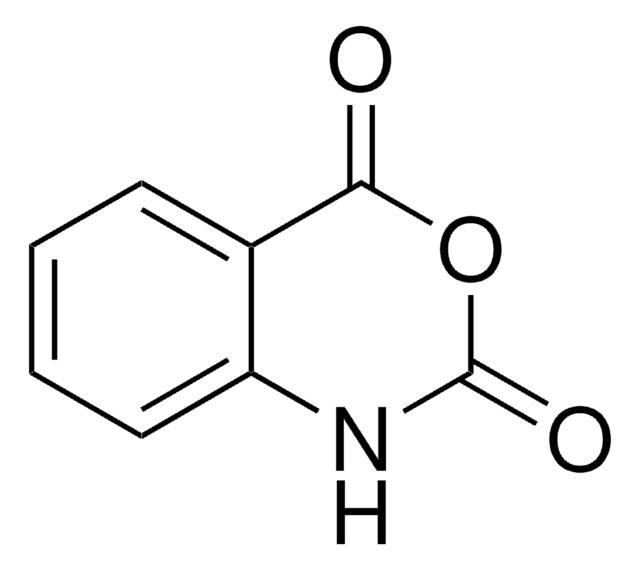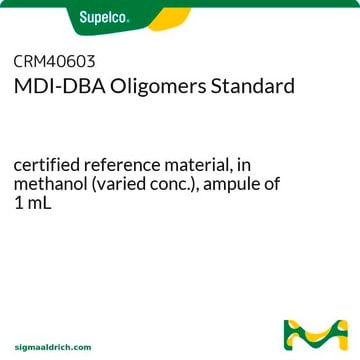8.20797
Diphenylmethane 4,4′-diisocyanate
(mixture of di-and triisocyanates) for synthesis
Sinónimos:
Diphenylmethane 4,4′-diisocyanate, Methylenediphenylene diisocyanate
About This Item
Productos recomendados
vapor pressure
0.066 hPa ( 20 °C)
Quality Level
form
liquid
autoignition temp.
>600 °C
potency
>5000 mg/kg LD50, oral (Rat)
>9000 mg/kg LD50, skin (Rabbit)
expl. lim.
0.4 % (v/v)
bp
196 °C/7 hPa
mp
10 °C
transition temp
flash point 196 °C
solubility
2 g/L (decomposition)
density
1.239 g/cm3 at 20 °C
storage temp.
2-30°C
InChI
1S/C15H10N2O2/c18-10-16-14-5-1-12(2-6-14)9-13-3-7-15(8-4-13)17-11-19/h1-8H,9H2
InChI key
UPMLOUAZCHDJJD-UHFFFAOYSA-N
Application
- Oil absorption enhancement with hydrophobic nanofibrils: Hydrophobic cellulose nanofibrils modified with Diphenylmethane 4,4′-diisocyanate and other diisocyanates demonstrated improved performance in absorbing circulating oil, offering significant potential for environmental cleanup applications (Chen et al., 2024).
- Evaluation of adhesion enhancers for foliar applications: Research on self-assembling eugenol-loaded particles, which might involve Diphenylmethane 4,4′-diisocyanate for carrier adhesion on leaves, indicated enhanced efficiency in foliar applications and underscored the importance of ecotoxicological safety (Zhang et al., 2023).
- Development of deformative polyurethane actuators: Diphenylmethane 4,4′-diisocyanate was used in the synthesis of self-healing polyurethane actuators that respond to light, heat, and humidity, highlighting its utility in creating smart materials for advanced engineering applications (Dong et al., 2023).
Analysis Note
Density (d 20 °C/ 4 °C): 1.237 - 1.242
isomer Diisocyantes (GC, area%): ≤ 10.0 % (a/a)
triisocyanate (GC, area%): 20.0 - 40.0 % (a/a)
Identity (IR): passes test
signalword
Danger
Hazard Classifications
Acute Tox. 4 Inhalation - Carc. 2 - Eye Irrit. 2 - Resp. Sens. 1 - Skin Irrit. 2 - Skin Sens. 1 - STOT RE 2 Inhalation - STOT SE 3
target_organs
Respiratory system
Storage Class
11 - Combustible Solids
wgk_germany
WGK 1
flash_point_f
411.8 °F - closed cup
flash_point_c
211 °C - closed cup
Certificados de análisis (COA)
Busque Certificados de análisis (COA) introduciendo el número de lote del producto. Los números de lote se encuentran en la etiqueta del producto después de las palabras «Lot» o «Batch»
¿Ya tiene este producto?
Encuentre la documentación para los productos que ha comprado recientemente en la Biblioteca de documentos.
Los clientes también vieron
Nuestro equipo de científicos tiene experiencia en todas las áreas de investigación: Ciencias de la vida, Ciencia de los materiales, Síntesis química, Cromatografía, Analítica y muchas otras.
Póngase en contacto con el Servicio técnico











